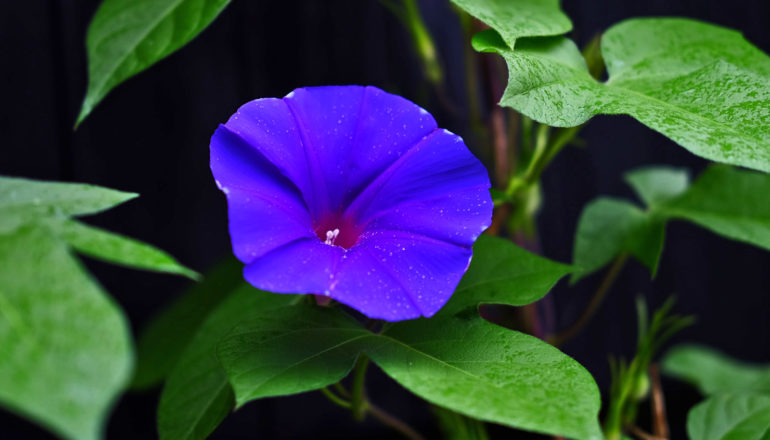
- Home
-
Home & Garden
- Food & Nutrition
Morning Glory Symbiosis May Yield New Psychedelic Drugs
- Barri Bronston-Tulane
- Read Time: 3 mins
nks to a symbiotic fungus, many species of morning glories contain elements of powerful psychedelic drugs called ergot alkaloids, according to new research.The seeds of the common tropical vine, whose namesake trumpet-like blooms only open in the morning, contain compounds that could be useful for treating mental and physical diseases as well as promoting well-being, says plant and fungal biologist Keith Clay, chair of the Tulane University department of ecology and evolutionary biology.
Researchers obtained samples of morning glory seeds from worldwide herbarium collections and screened them for ergot alkaloids, a compound associated with the hallucinogenic drug LSD, but which have also been used for treating migraine headaches and Parkinson’s disease.
Many morning glory species contain high concentrations of bioactive ergot alkaloids that are produced by specialized fungal symbionts passed down from mother plant to offspring through their seeds. Researchers found that one-quarter of over 200 species tested contained ergot alkaloids and were therefore symbiotic.
“The symbiosis and ergot alkaloids are specific to particular branches of the morning glory evolutionary tree, and each branch contains different ergot alkaloids and alkaloid mixtures,” Clay says.
Get The Latest By Email
Ergot alkaloids have had long and convoluted association with humans. Ergot alkaloids get their name from the ergot fungus responsible for deadly outbreaks of Saint Anthony’s Fire in the Middle Ages. The disease results from ingestion of the fungus. The best-known ergot alkaloid is LSD, a synthetic derivative of naturally occurring ergot alkaloids in morning glories produced by their fungal partners.
Indigenous peoples of Central and South America have historically used such alkyloid compounds for for their effects on the human mind and for regulating human reproduction. More recently they have been used for obstetric issues during labor and delivery and for treatment of migraine, Parkinson’s, and other maladies.
“We have known a lot about the fungal alkaloid chemistry and its effects on the mind and body for long time,” Clay says. “Our study is the first to show how highly coevolved morning glories and their symbiotic fungi are, and that coevolution is manifested by different mixtures and concentrations of ergot alkaloids across the morning glory evolutionary tree.”
Coauthors of the study in the journal Communications Biology are from Tulane, Indiana University, and the West Virginia University.
Source: Tulane University
About The Author
Barri Bronston-Tulanebooks_herbs
LATEST ARTICLES

Urban Soil Is Often Overlooked As A Resource
Sunday, 02 May 2021 08:18When you think about soil, you probably think of rolling fields of countryside. But what about urban soil? With city dwellers expected to account for 68% of the world’s population by 2050, this oft...

DIY Exercise Program: Stay Fit Without Breaking the Bank
Wednesday, 26 July 2023 12:55With the rising cost of living, gyms memberships and fitness classes are becoming increasingly unaffordable. But the good news is you can make just as much progress at home.

Asthma and Diet: The Impact of Food on Your Lung Health
Tuesday, 25 July 2023 17:28Certain foods or dietary patterns are linked with better control of your asthma. Others may make it worse. Depending on what you’ve eaten, you can see the effects in hours.

How Injuries Change Our Brain and How We Can Help It Recover
Monday, 07 June 2021 08:07Injury to the adult brain is all too common. A brain injury will often show up on brain scans as a well-defined area of damage. But often the changes to the brain extend far beyond the visible...

Can Bad Weather Really Cause Headaches?
Wednesday, 21 April 2021 07:23Whether it’s your arthritic relative who knows rain is on the way when their knees ache or your lifelong pal who gets a headache when a storm is approaching, we all know somebody who claims they...

Why Anti-Nutrients Are Part Of A Normal Diet
Monday, 17 May 2021 08:55Maybe you’re trying to eat healthier these days, aiming to get enough of the good stuff and limit the less-good stuff. You’re paying attention to things like fiber and fat and vitamins… and...
New Attitudes - New Possibilities
InnerSelf.com | ClimateImpactNews.com | InnerPower.net
MightyNatural.com | WholisticPolitics.com | InnerSelf Market
Copyright ©1985 - 2021 InnerSelf Publications. All Rights Reserved. - Food & Nutrition

